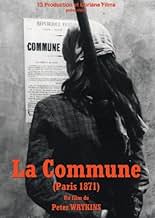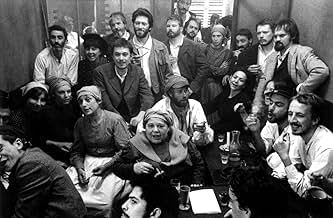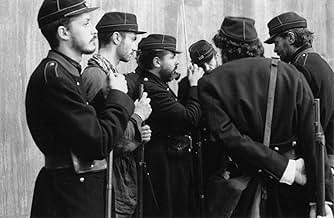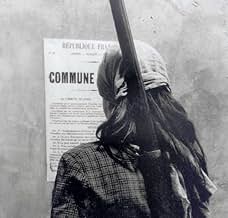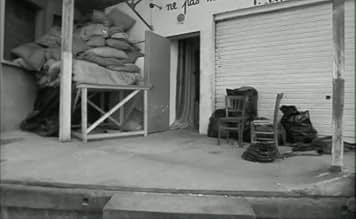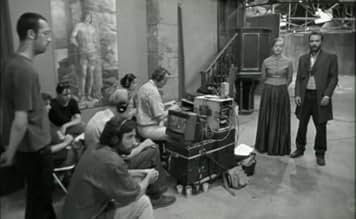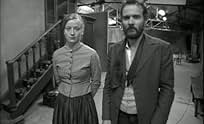La commune (Paris, 1871)
- 2000
- 5 घं 45 मि
IMDb रेटिंग
8.0/10
1.4 हज़ार
आपकी रेटिंग
अपनी भाषा में प्लॉट जोड़ेंIn this war drama blurring the lines between documentary and fiction, the working class and the bourgeoisie of 19th century Paris are interviewed and covered on television, before and during... सभी पढ़ेंIn this war drama blurring the lines between documentary and fiction, the working class and the bourgeoisie of 19th century Paris are interviewed and covered on television, before and during a tragic workers' class revolt.In this war drama blurring the lines between documentary and fiction, the working class and the bourgeoisie of 19th century Paris are interviewed and covered on television, before and during a tragic workers' class revolt.
- निर्देशक
- लेखक
- स्टार
- पुरस्कार
- 1 जीत और कुल 1 नामांकन
फ़ीचर्ड समीक्षाएं
Peter Watkins stands at the base of a form of historical documentaries known as 'documentary reconstruction'. Lightly based on battle re-enactments, Watkins hires amateur actors to play the roles of common people in the Paris of 1871. Famine and civil unrest cause a popular revolution, supported by followers of Karl Marx. The people take power and form a Commune, a communist government. After a few weeks, the official Versailles government regains the city by force, and tens of thousands of people are executed.
Watkins' historical drama is based on the common people, which are shown in their everyday life. To do this, he introduced an anachronism: in the 1871 context, the people form a tv station. The Versaillais also have their official tv station. This way, the documentary becomes both a social project and a media experiment.
Watkins' historical drama is based on the common people, which are shown in their everyday life. To do this, he introduced an anachronism: in the 1871 context, the people form a tv station. The Versaillais also have their official tv station. This way, the documentary becomes both a social project and a media experiment.
Once again, the National Gallery of Art film program has brought us another film we are unlikely to see at any other theater. This is an uneven but ultimately fascinating look at a relatively unknown period in French history, the 1871 Communard revolution in Paris right after the Franco-Prussian War. The filmmaker uses non-professional actors who were also allowed to be co-producers and to write their own lines to some extent. It is shot in black and white and on Beta Digital tape. The film technique reminds me of an old TV program from the 1950s' called "You Are There" in which today's media looks back on history and even interviews the participants in the historical drama.
The film is very slow going which gives the viewer a total feeling of both being there right in the action on a day to day basis while looking down on it from afar. We live the everyday life of the people in Paris during this short period of 2 1/2 months. At some points, the actors stop the action and comment on their involvement in the making of the very film they are in. Also, they and the filmmaker comment on globalization and peoples' rights in today's world. History is brought forth into our present time and we see that all events in human history are more alike than they are different.
This film is not for the average movie-goer. It is for a small audience of patient students of history and politics. It fascinated me but also tried that patience quite often. I would recommend not attempting to view this film without being well rested. It is in two parts of three hours each. Frankly, the filmmaker could have cut this down and still had a powerful history lesson for all of us.
The film is very slow going which gives the viewer a total feeling of both being there right in the action on a day to day basis while looking down on it from afar. We live the everyday life of the people in Paris during this short period of 2 1/2 months. At some points, the actors stop the action and comment on their involvement in the making of the very film they are in. Also, they and the filmmaker comment on globalization and peoples' rights in today's world. History is brought forth into our present time and we see that all events in human history are more alike than they are different.
This film is not for the average movie-goer. It is for a small audience of patient students of history and politics. It fascinated me but also tried that patience quite often. I would recommend not attempting to view this film without being well rested. It is in two parts of three hours each. Frankly, the filmmaker could have cut this down and still had a powerful history lesson for all of us.
Truly exceptional film making really breaking down the barriers of what is storytelling and letting everything run free. Peter Watkins does what would seem the impossible, not only create a realistic re-enactment of the commune in Paris (just after the siege of the Prussians and the exile of the bourgeois to Versailles) using only an abandoned warehouse and 200 odd unemployed French citizens and illegal immigrants but also to on top of that add a detailed and amazing social experiment. Putting these people through this experience and then have them portray not only their 1871 characters but also themselves in the one film. To hear these people talk about life today and draw parallels between the film they are making and the lives they lead is quite invaluable information. And as if that alone wasn't enough there is the whole other element of the media and how sides are formed and why people believe what they do and how things are taught and passed down so that divides never seem to cease. The use of reporting and television and newspapers really give this film a whole other level from which to operate and constantly throughout the film one has to ask themselves "who do I believe, do I believe anyone" "why am i believing what this person says and not this person" then as if one hasn't had enough thinking to do already you then, like the cast, have to project forward to today and ask yourself who do i believe when it comes to the reporting of current events? Am I receiving an accurate picture of what is occurring? I don't think anyone who offers themselves up to this 6 hour masterpiece can look at the media in quite the same way. Once again I just have to say this film is without a doubt set to become a masterpiece to filmmaking and I urge anyone who happens to see it on a program for a festival or perhaps even on television to sacrifice those few hours, you wont be disappointed. Also is you are left in awe after its viewing as I was then look out for the Universal Clock- The Resistance of Peter Watkins, it acts as a sort of "making of" but is a film in its own right and gives insight to what it was like to be involved in the making of Le Commune Paris 1871
Peter Watkins' nearly 6-hour long docudrama, "La Commune (Paris, 1871)," is a surprisingly passionate and fast-moving lesson in history. It is also a brilliant demonstration of how history is shaped, and re-shaped, by the tellers of the tale.
Using the "You Are There" approach of earlier radio and TV days, Watkins has a male and female news team from "Commune TV" wandering through the poorest district of Paris inviting people to express their grievances against the state to the camera.
While the people bitterly suffer because of the government's inept defeat at the hands of the Germans during the Franco-Prussian War, their anger inspires solidarity for them throughout Paris, and although they briefly rise up and seize power, they are brutally put down in the end.
Ironically, during the course of their uprising, a TV monitor in the background features happy-talk "Versailles TV" news anchors, who continually vilify the Communards and rationalize the government's brutal acts of supression.
"La Commune" is a must-see for students of history, and a must-see for students of the media.
Using the "You Are There" approach of earlier radio and TV days, Watkins has a male and female news team from "Commune TV" wandering through the poorest district of Paris inviting people to express their grievances against the state to the camera.
While the people bitterly suffer because of the government's inept defeat at the hands of the Germans during the Franco-Prussian War, their anger inspires solidarity for them throughout Paris, and although they briefly rise up and seize power, they are brutally put down in the end.
Ironically, during the course of their uprising, a TV monitor in the background features happy-talk "Versailles TV" news anchors, who continually vilify the Communards and rationalize the government's brutal acts of supression.
"La Commune" is a must-see for students of history, and a must-see for students of the media.
This is a pretty exhilarating idea.
Take a period in history where its all about collective points of view. In other words, select a time where the movies chosen by groups clash. Its better if it a time before movies and in a place that believes they know something about movies.
Introduce it as a movie, with interviews first with actors and then with characters. Then, action (with characters glancing at the camera), but wait.
Soon we see that inside the movie, we will see reporting by a TeeVee news crew. This is displayed in two forms within the film.. We see the news broadcast and the Parisans watching it.
They are of course biased in favor of the royalist government. So just as the rabble revolt against the government, we have an alternative TeeVee crew enlisted, who also go around interviewing the crowd as well, all obviously amateur actors, not starving, not sick, toothless and in pain.
We are introduced to characters who introduce themselves as fictional characters. We see the two TeeVee reporters take on the character of the events we see, and get blamed for the whole thing, history writing itself. It is the only example I know of this particular type of fold, where our notion of history as retrospective watching is folded into on-screen watchers.
But at so many hours, its a long slog because there is some conflating of French history with French film history, and its just not as profound as they suppose.
Ted's Evaluation -- 2 of 3: Has some interesting elements.
Take a period in history where its all about collective points of view. In other words, select a time where the movies chosen by groups clash. Its better if it a time before movies and in a place that believes they know something about movies.
Introduce it as a movie, with interviews first with actors and then with characters. Then, action (with characters glancing at the camera), but wait.
Soon we see that inside the movie, we will see reporting by a TeeVee news crew. This is displayed in two forms within the film.. We see the news broadcast and the Parisans watching it.
They are of course biased in favor of the royalist government. So just as the rabble revolt against the government, we have an alternative TeeVee crew enlisted, who also go around interviewing the crowd as well, all obviously amateur actors, not starving, not sick, toothless and in pain.
We are introduced to characters who introduce themselves as fictional characters. We see the two TeeVee reporters take on the character of the events we see, and get blamed for the whole thing, history writing itself. It is the only example I know of this particular type of fold, where our notion of history as retrospective watching is folded into on-screen watchers.
But at so many hours, its a long slog because there is some conflating of French history with French film history, and its just not as profound as they suppose.
Ted's Evaluation -- 2 of 3: Has some interesting elements.
क्या आपको पता है
- इसके अलावा अन्य वर्जनIn December 2002 Peter Watkins started the editing of an abridged theatrical version. In a prologue he expresses his views on discovering that the production company, 13 Production, has financial links with the Lagardère Group (which sells Military Weapons through Matra), then he warns the audience about how much of the sequence shots and live debates from the original full-length movie have been lost in the process of reducing the running time by more than 2 hours to 3 hrs 1/2.
- कनेक्शनFeatured in The Universal Clock: The Resistance of Peter Watkins (2001)
टॉप पसंद
रेटिंग देने के लिए साइन-इन करें और वैयक्तिकृत सुझावों के लिए वॉचलिस्ट करें
- How long is La Commune (Paris, 1871)?Alexa द्वारा संचालित
विवरण
- रिलीज़ की तारीख़
- कंट्री ऑफ़ ओरिजिन
- भाषाएं
- इस रूप में भी जाना जाता है
- La Commune (Paris, 1871)
- उत्पादन कंपनियां
- IMDbPro पर और कंपनी क्रेडिट देखें
बॉक्स ऑफ़िस
- US और कनाडा में सकल
- $5,340
- US और कनाडा में पहले सप्ताह में कुल कमाई
- $2,930
- 6 जुल॰ 2003
- दुनिया भर में सकल
- $21,641
- चलने की अवधि
- 5 घं 45 मि(345 min)
- रंग
- ध्वनि मिश्रण
- पक्ष अनुपात
- 1.66 : 1
इस पेज में योगदान दें
किसी बदलाव का सुझाव दें या अनुपलब्ध कॉन्टेंट जोड़ें

